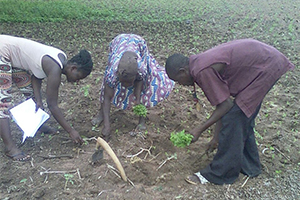Farmers in Ghana are willing to pay more to protect groundwater quality when presented with information on the human health effects of fertilizer than when presented with its environmental effects, according to a recent study funded by DWFI and published by Faculty Fellows Christopher Gustafson and Karina Schoengold and former PhD student, Dr. Mustapha Alhassan.

The two primary aims of the research were to measure the farmers’ valuation of groundwater quality, and to examine the effect of information on farmers’ willingness to pay to protect it. Researchers surveyed 503 randomly selected smallholder irrigation farmers from nine communities in the Upper East region in northern Ghana. In the surveys, one scenario emphasized groundwater pollution and the environment while the other scenario emphasized human health risks of groundwater contamination.
The study took many factors into consideration, including type of water well; type of agriculture; age of farmer; literacy and education; etc. Results indicate that farmers do value groundwater quality, particularly if their households depend on groundwater for domestic uses. Researchers found that future groundwater policies in the area should take into consideration the impacts of agricultural production on groundwater quality and human health. An understanding of how information affects willingness to voluntarily undertake costly actions is also critical to motivate action from farmers.


